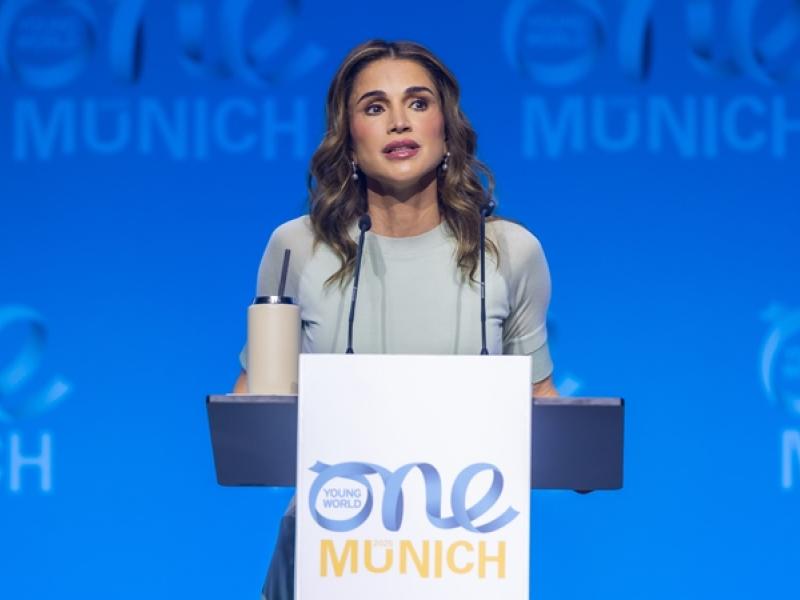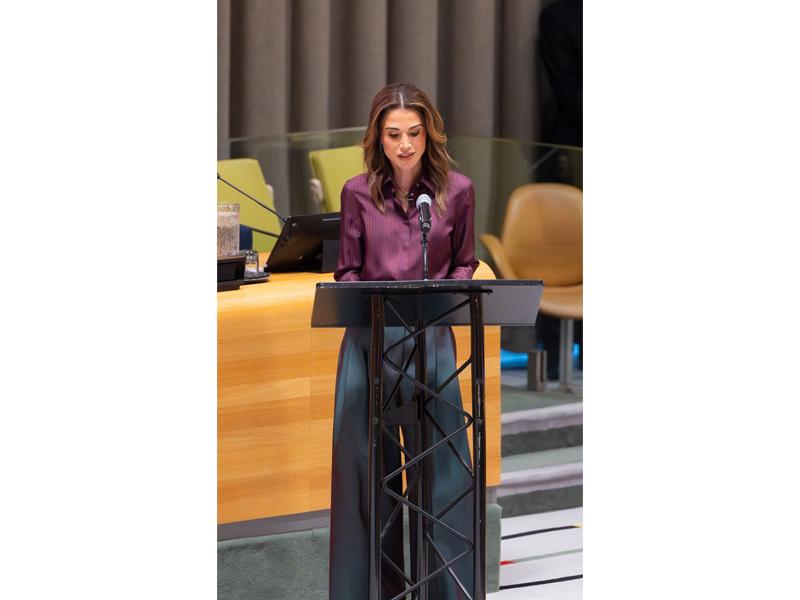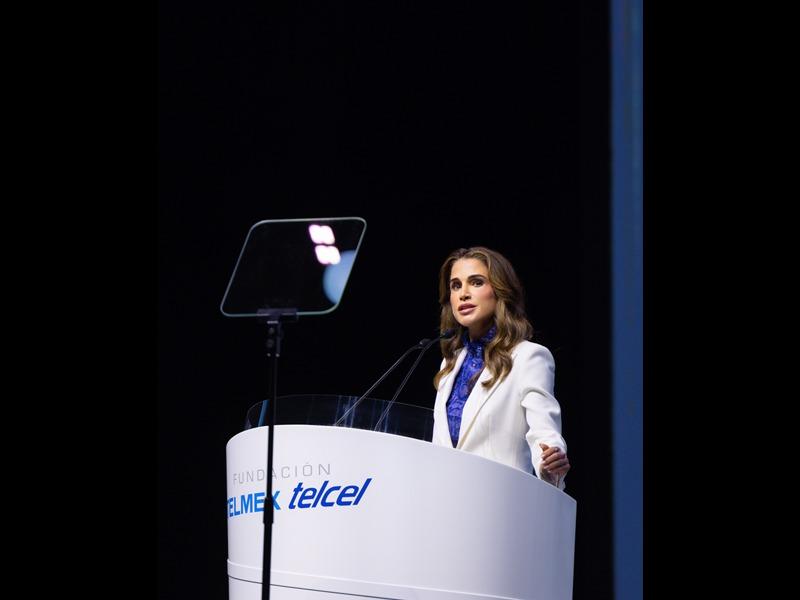Speaker …. Please welcome Her Majesty Queen Rania
HMQ – Thank you, Darren, for your very kind words and more importantly for all that you’ve been doing over the last couple of years to try to embed the concept of sustainability in our region. I’d like to also welcome all our ASLG members who have shown a great deal of commitment to this issue and have been very steadfast in their adoption of the principles of sustainability and have tried to garner more support for it in the region and to get more people on board the sustainability bandwagon, something that we all really need to do. I’d like to welcome all the rest of you who are interested in this issue and who have taken the time and effort to join us and to try to listen and hear what’s being done on this particular topic. And I’d like to emphasize that this session is not only going to be about hearing and learning, but it’s also going to be about trying to apply some of these lessons when you go back to your workplace.
I think, you know, you don’t need me to tell you that the whole world is at a crossroads at this stage. Everybody is really thinking at this stage, with you know the financial crisis, everyone is thinking ‘pause’, is going through a phase of reflection and introspection, reassessing our values. Things that we held as true and we were very confident in, now we are beginning to question. Hopefully at the end of this process of reflection, we’ll be coming out with a set of values that will govern the way we move forward, whether it’s in the economic field, the social or the political. And there’ll be a reevaluation of the underlying ecosystem that governs the organizations, international organizations that govern our world. I think that we are looking at systematic changes because we have been underserved by these organizations and institutions, Many have been established under criteria that are no longer applicable. Many have been established in a post WW2 era under a set of circumstances that have become obsolete and as a result they have underserved humanity in terms of trying to deal with poverty, unemployment, sustainability, conflict resolution and many other areas. So this is a time, to really take a pause and as Arabs, and in our region we need to do our own process of reflection. We also need to take a step back and look at the scene and say, you know, what are we going to adopt and what are we going to drop. What is the way forward? What has worked and what hasn’t? How do we change the way we do things?
Our region has its own unique set of circumstances. Now we are all obviously affected by the global crisis but to add to that layer of problems, there’s our chronic water shortage, very high rate of unemployment, high illiteracy rates, outdated school systems, high percentage of women who are unemployed, a brain drain, a youth population that is exploding. How are we going to deal with those issues? Now all of us here as I have said are here because we are guided by a collective conscience. We know about the inequalities that plague our world, we know about the fragilities of our environment and we know that we can make a difference. In fact, according to the annual Ebelman Trust barometer many of the, the majority of opinion leaders believe that business can play a role that no other institution can play in addressing these inequalities. How can we do this? Through sustainability and responsible competitiveness. Now these are terminologies that are kind of new to the Arab lexicon so I think so I think it’s important to make sure we are on the same sheet of music. What is sustainability? Sustainability is a loaded word and basically means being able to meet the needs of our generation without compromising the ability of the next generation to meet their own. Whether it’s in the realm of social realm or economic, political or environmental realms. It’s basically doing well and doing good at the same time. So for example, in a business, being able to turn out a profit while providing people with skills and good experience. Or, for example, producing a product that is environmentally friendly etc. It goes on. Now responsible competitiveness, which is quite a mouthful so I think we’ll just call it ‘RC’, that is when government, businesses and NGOs come together and create an environment that promotes sustainability. So the government will create a policy framework that is friendly to people, business and the environment. The private sector will chase social profit as the make financial gains. The NGOs and media will hold the governments and businesses accountable as well as try to come up with solutions for issues. So, and a recent study has shown that you know, during this particular crisis, companies that have adopted sustainable practices have actually outperformed others by 15% so that is quite substantial. But it’s not just about profits. Companies that adopt sustainable practices are more highly regarded by everyone, whether it’s the stakeholders, board members, potential employees, the customers, the media, government etc. So it’s a win win situation for everyone. So, as I said, this is a critical moment for all of us and, you know, and we want to see here.. I’m very glad that since we established ASLG, that many companies have come on board locally for example in Abu Dhabi and Egypt. And when it comes to RC, they have taken root in Saudi Arabia, Jordan, UAE and Egypt again. So we want to try to reach that critical mass where we can make a difference. And on another note, I just want to say on a more personal note, sustainability is also something that affects our lives as individuals. It’s not just the kind of effect that you have within your company or the projects that you are working on, it also gives you a different perspective and for many of us in our careers when we reach that point and start asking ourselves, you know, what is it all about, why am I doing this, sometimes sustainability can give you the answer because it kind of frames your life in a different context. It extends the boundaries of where you define yourself to include your environment, to include your country, to include the community that surrounds you and you become a part of something much much larger. And I’ve found personally that that has been something that has added that extra layer of fulfillment that one needs. And we look at the future generations and how the landscape is going to look for the Arab world. It’s not just about what kind of policies we adopt and political resolutions we find but it’s also how we deal with each other, what values we adopt when we deal with each other, how we interact. And that can be very much affected when we adopt sustainable practices, when we adopt the whole concept of responsible competitiveness because it changes the way you look at your fellow human being, it changes the way you interact and how you relate so at the end of the day it means a cultural change as well. I know from discussion that it can all sound extremely technical and quite intimidating sometimes but at the end of the day it’s about people to people and it’s about how you see yourself and your contribution to your surroundings. So without much further ado, I would just like to hand the floor over now to some of our panelists here who could really give us a good idea of how innovation can be brought to bear on the landscape that surrounds us and how it can change the environment here in the Arab world. So thank you all very much.
Applause


